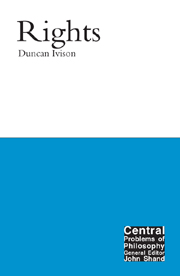2 - Natural law and natural rights
Summary
The Commonwealth of learning here is taking a complete holiday; we have all become politicians.
(John Locke to P. van Limborch, 7 August 1689)Introduction
One of the most straightforward ways of thinking about rights is to say that people just have them: that it is a basic moral fact about persons. Just as our conception of a person includes things such as “has reason” or “is a conscious being”, so it includes the idea that people have rights. The American philosopher Robert Nozick famously opened his critique of liberal egalitarianism, Anarchy, State and Utopia, with this claim: “Individuals have rights, and there are things no person or group may do to them (without violating their rights)” (1974: ix). Nozick was drawing on a rich tradition of thinking about the nature of rights. He did so in order to promote libertarian political ends, using the basic claim about the inviolability of individual rights – and especially property rights – to undermine the case for redistributive social justice and an expansive welfare state. But as we shall see, to assert that people have rights in virtue of their personhood, or their “humanity”, that they have “natural rights”, in other words, can lend itself to any number of different political ends. The Declaration of the Rights of Man and of the Citizen made by the French Assembly in 1789 proclaimed in its second article that “[the] aim of every political association is the preservation of the natural and inalienable rights of man”, which it listed as liberty, property, security and resistance to oppression. A few years before that, in 1776, the United States Declaration of Independence announced that “all men are created equal … endowed by their Creator with certain unalienable rights; that among these are life, liberty and the pursuit of happiness”.
- Type
- Chapter
- Information
- Rights , pp. 37 - 61Publisher: Acumen PublishingPrint publication year: 2007

